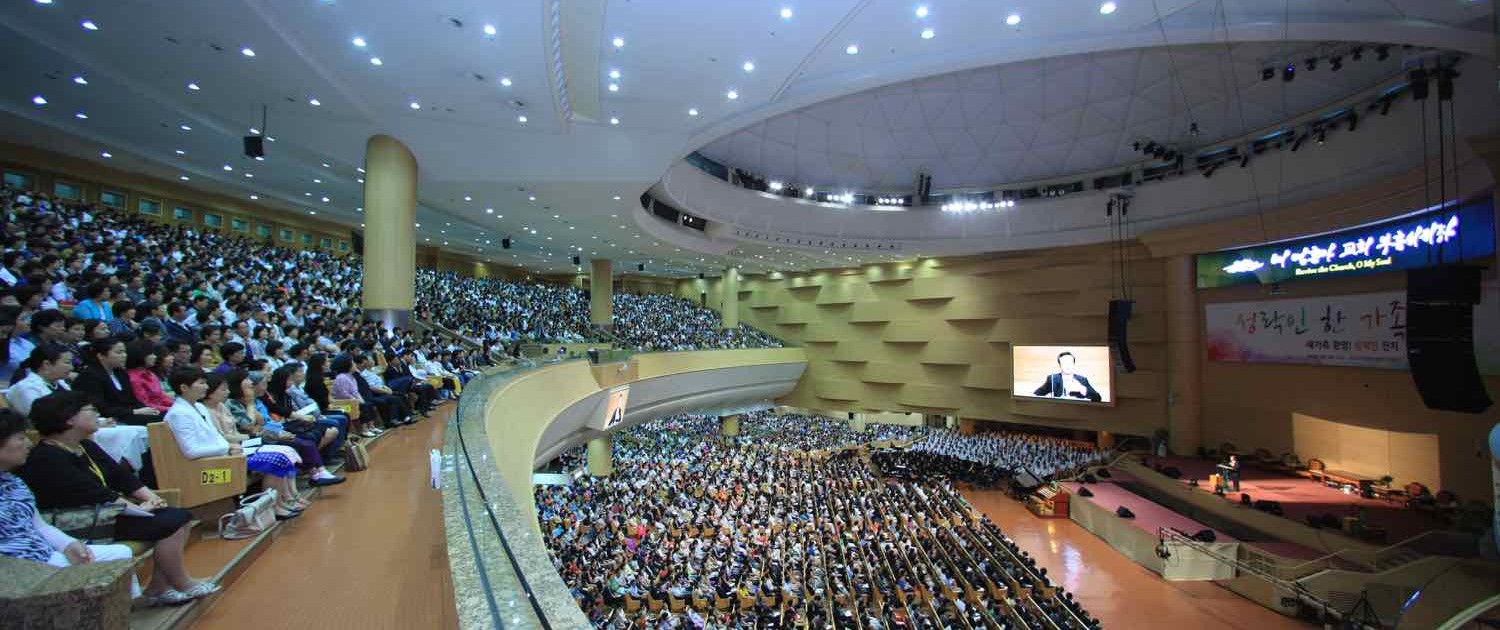2016.03.20_Love is to Forgive
in 2016 Lord's Day, Ki Dong Kim
Senior Overseer Ki-Dong Kim

[Matthew 18:21-35]
God
is love.
He loved the world
with everlasting love (Jn 3:16)
and demonstrated His love on the cross,
even to the point of shedding His blood (1 Co 1:18).
The world is filled with suffering, for it is in absence of love;
it is filled with resentment because there is no love.
The world is devoid of forgiveness,
and hence devoid of freedom,
and filled with worldly religions and superstitions.
The Law was found weak,
for it is devoid of forgiveness (Rm 8:3);
but life is found in the Gospel
because there is the forgiveness of love (Jn 10:10).
While the world is teeming with people
who have not been forgiven,
we have received forgiveness (Ep 2:8);
we have received the love of God (Mt 3:17).
Jesus is the Savior of love,
and the Holy Spirit is the Paraclete of love (Gal 5:22).
Love means to forgive one another (Mt 5:7).
○One day, we will all depart from this earth.
And we will leave behind everything
that cannot inherit the kingdom of heaven.
○Love we will take with us,
but everything devoid of love will be left behind.
If we do not receive God’s love, we will be left behind.
○To forgive is to love.
We ought to forgive even seventy times seven,
and love, just as Jesus shed His blood
※Jesus Christ is love.
His blood is love,
and His grace is everlasting love.
Jesus redeemed humanity who broke the first commandment Man succumbed to the devil’s temptation and failed to keep God’s commandment. Consequently, his spirit died. The spirit’s death does not mean the spirit disappeared, but that it was doomed eternal punishment in hell. God had pity for man who was in such a state of despair, and sent Jesus Christ to die on the cross. Through the death of His own Son, God opened a way to salvation for us. The Lord gave us baptism as a course through which we can escape our doomed fate. Though it takes only a short time for one to be baptized, the spiritual transformation brought about by baptism is huge. As soon as a person is immersed underwater, he buries his old self that died of sin, and is united with the risen Christ as he comes out of the water. Thus he obtains the right to partake in the resurrection. Jesus redeemed us by paying the price of our sin in our place. The word redemption carries the meanings ‘to save’ and ‘to pay a debt’. Jesus accomplished redemption once and for all; He cannot be crucified ever again. He paid the price of man’s sin once and for all when He died on the cross (Rm 6:23). Do not sin willfully, for you have been redeemed Our love towards God must forever be unchanging. We should not quench out the grace of God by sinning willfully (He 10:26-31). To sin willfully means to contend with God. In other words, it means to return to the state prior to being baptized and thus become God’s enemy all over again. Whoever sins willfully like so does not have the chance to repent again. God did not provide another sacrifice for sin for such a person. The church is the body of Jesus (Ep 1:23), and Jesus is God. Hence if anyone opposes the church, he can also considered as sinning willfully. Jesus said, “If your brother sins, go and tell him his fault between you and him alone. If he will not hear, take with you one or two more, that ‘by the mouth of two or three witnesses every word may be established.’ And if he refuses to hear them, tell it to the church. But if he refuses even to hear the church, excommunicate him” (Mt 18:15-17). Redemption from Adam’s sin of disobeying God’s commandment was accomplished once only. To sin willfully is an act of denying this grace of God, and therefore whoever sins willfully cannot expect any mercy from God. As even Jesus cannot be an Advocate for such a person, he will have to give account of himself to God (Rm 14:12). Love is to forgive We became brothers and sisters in Christ through baptism. Thus we now ought to love one another. Though someone gives up his life to save another, if he has not love, it means nothing (1 Co 13:1-3). What is love? It is forgiveness. Just as God redeemed and forgave us, we also have to love one another. A king took pity on a person who owed him ten thousand talents and cancelled his debt. However this person did not show such mercy to the one who owed him a hundred denarii and put him in jail until he could pay him back. When the king found out, he called the person and said, “I forgave you all that debt because you begged me. Should you not also have had compassion on your fellow servant, just as I had pity on you? Now you must pay back all your debt”. After Jesus said this, He emphasized this by saying, “My heavenly Father also will do to you if each of you, from his heart, does not forgive his brother his trespasses” (Mt 18:23-35). When Peter asked, “Lord, how often shall my brother sin against me, and I forgive him? Up to seven times?” Jesus answered, “I do not say to you, up to seven times, but up to seventy times seven” (Mt 18:21-22). This means we have to forgive endlessly. The world is increasingly becoming evil. Nowadays it often happens that parents harm their children and vice versa. The most important element within the relationship of parents and children is love. No matter how well parents feed and clothe their children, without forgiveness it is not true love. This is the same between husband and wife; there must be love. A wife must forgive her husband and the husband his wife. God redeemed humankind who broke the first commandment and was doomed to death. Thus to sin against God willfully means to become His enemy forever. Anyone who sins against the church cannot be forgiven either, for that is also a sin committed willfully. However, any struggle or conflict between people can be resolved if only there is forgiveness. If brothers and sisters forgive one another, the church will be filled with love. There must be forgiveness between husband and wife, parents and children. Without holding a grudge, everyone ought to forgive one another by the help of the Holy Spirit.
God is love. He created humankind for His own will and in order to preserve them, He gave them a commandment forbidding them from eating from the tree of the knowledge of good and evil. God created man to have a free will so that he may choose to either obey or disobey God’s will (Deut 30:19).
A person who has been redeemed must not go on sinning willfully. God allows the redeemed to be baptized, receive the laying on of hands, receive His good words, and taste the powers of the coming age and the gifts of the Holy Spirit. A person who falls away after having such clear experiences cannot be renewed again to repentance. If there are any little chances remaining, he must constantly maintain a grateful heart towards the Lord for His love which saved him, and obey His words (He 6:1-8).
God gave new life to the redeemed. This is so that those who received life may have everlasting life (Jn 12:50). Just as Jesus obeyed the Father’s commandment in order to be raised to life, we also have to obey God’s commandment in order to have eternal life. This commandment is that we should love our brothers.
As a young man aged nineteen, I was filled by God’s Holy Spirit, His gifts and saw visions, and endlessly shouted the power of the blood of Jesus on the floor of the church worship center. From that day, I read the Old and the New Testament over and over again even to the point of memorizing them. That’s when the Lord called me as an evangelist; I was twenty-four years old. As I grew older year after year, utterly devoted to preaching, now I’m already nearing life’s sunset. The remaining days of my life are unknown, but the days are being swallowed up, as a silkworm nibbles away at a mulberry leaf. When I moved to Seoul, our family was just my wife, son and myself, the three of us. But now we are seven, with my daughter-in-law and grandchildren, and the congregation has grown from none to tens of thousands. Having walked the single way all my life, I am physically tattered and worn, drained of every last bit of energy. Only memories of the hard years past remain as memories buried in Songjugam (pine, bamboo and rock). There is nothing for me to take from this world but only things to leave behind, and my earnest wish is to leave behind as much as I can. Like scraping off even the last grain of rice from the bottom of the pan, I want to leave behind each and every glorious experience I had. Though I’ve never been a man of much knowledge, I yearn to pour out everything in my spirit for the glorious mediation of the Gospel, and use all the spiritual gifts I have before I depart. Then after I have poured out everything from my spirit, I hope to revive my soul’s tears and joy, all of my experiences in this world to bloom again through literature. All my life I’ve been Semuon (though I see and hear, I will not speak), my body – a breathing lump of clay – is slowly fading away. Nevertheless, I think about how my writings will remain to be translated and blossom with seeds, which will spread throughout the world. And so they must. Though I myself have written and composed those books, they surely contain the Will of God. They are the Lord’s which I cannot take with me, for they were written by the inspiration of the Holy Spirit, and thus they will be read wherever the Lord’s name is. Not once in my life have I ever scribbled away idly. Tears of gratitude run down, as I reminisce and think about each of the people I love in this world. Those whom I resented and despised also remain as but a memory of regret. I’m ashamed that I couldn’t love those I would leave behind anyway. I’m human, just a mere man. This man is disappearing into the midst of the fog. Those that remember and appreciate me will all fade away with time; my loved ones will remember me no more. Yet my writings will live on and resurrect to bloom with seeds and spread far and wide. Hopefully the church I planted with all my heart, body and life, will zealously love the Lord in my place. Forgive me if I have ever failed anyone. Pastor Ki-Dong Kim
[gmedia id = 75]
Outline and Summary translated by Sarah Lee Chief Editor: Helen Nam
Lord’s Day Worship Column
Letter translated by Sarah Lee
Interpretations by Sarah Lee
Korean Summary by Ki-Taek Lee


